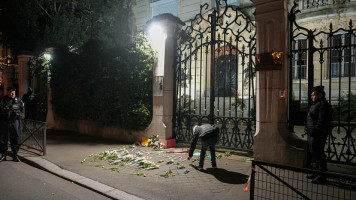Consultations to form a new Israeli government begin
To kick off consultations to form a new Israeli gov't, the Israeli president will meet with party leaders elected to the 25th Knesset to hear their recommendations. Then, he will task a party leader who can most likely form a ruling coalition.
"I intend to complete the consultations process by Friday, and I shall assign the task of forming a government this coming Sunday," Israel's president said upon receiving the official results of the elections this morning.
On Wednesday afternoon, President Issac Herzog will meet leaders of the Likud, Yesh Atid, National Unity and Shas.
He is scheduled to meet representatives of the Arab parties on Thursday. However, they are not expected to endorse anyone for forming a new government.
The leaders of the National Unity party and Yisrael Beiteinu also signalled that they would not tap anyone to assemble the new government.
Netanyahu's bloc, comprised of the Likud, Religious Zionism, United Torah Judaism and Shas, which won sixty-four Knesset seats out of a hundred-twenty, would be the probable pick of President Herzog to start a ruling coalition.
Prime minister Yair Lapid's bloc, which included Yesh Atid, National Unity, Labor, United Arab List (UAL) and Meretz, won fifty-one seats.
The joint electoral list of al-Jabha and the Arab Movement for Renewal won five seats. However, Meretz and Sami Abu Shehade's National Democratic Assembly missed the 3.25% threshold.
Muhammad Khalaileh, a researcher, told The New Arab that UAL leader Mansour Abbas' vision of "integrating in Israel" has failed despite it coming out as the largest Arab party in Israel.
Coalition Partners
Radical MK Itamar Ben Gvir leader of the Jewish Power party is believed to be close to getting the Public Security portfolio as part of a coalition agreement.
As minister of public security, he would be responsible for law enforcement bodies, including the Israel Police and the Israel Prison Service.
The Israeli police control entry and exit points to the al-Haram al-Sharif, home to the al-Aqsa Mosque and the Dome of the Rock. Jews refer to the site as Temple Mount.
"I expect the next Israeli government to escalate tensions with the Palestinians [in the occupied West Bank] and will try to adversely affect the status of Palestinian citizens in Israel," Mohammad Khalaileh said to TNA.
Changes in the Judiciary
Coalition partners of Benyamin Netanyahu seek "worrisome" changes in the judiciary system, particularly the Supreme Court's powers over the Knesset.
They believe the Supreme Court already has too much power over the Knesset and propose that only a unanimous vote of eleven judges could override legislation.
They would also like to see the Knesset have more leverage over the selection of Supreme Court judges and, interestingly, eliminate fraud and breach of trust as crimes. The last would rid Netanyahu of his corruption trial.
On the foreign relations front, Netanyahu is expected to strengthen the Abraham Accords and maintain opposition to a resumption of the
Joint Comprehensive Plan of Action, commonly known as the Iran nuclear deal.


